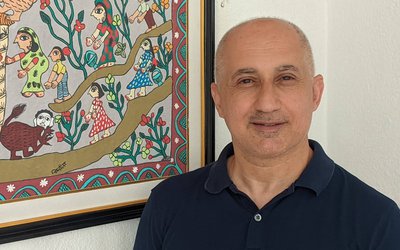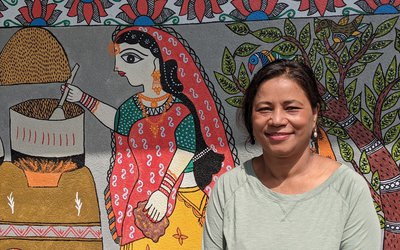
How do you see your role as the first female speaker of Legislature Parliament?
My election as the first female speaker of parliament is the result of political changes that have taken place in Nepal. My election is also a part of various struggles against various forms of exclusions and discriminations including women's struggle. This new constitution has addressed all kinds of discriminations and exclusions against women and other communities. My election as a speaker is just the beginning for a new inclusive Nepal.
You have just concluded your official visit to United Kingdom. How was your visit?
My visit was a part of bicentennial ceremony of establishment of bilateral relations between Nepal and United Kingdom. As soon as I received the invitation, I told the concerned British officials of my interest to make a visit. I had expressed my willingness to see the working of Parliament and committee systems and parliament related areas as Britain is known as the mother of parliament. As per my request, British officials showed us the functioning of the British Parliament, parliamentary committees and so forth.
What is your observation about the functioning of British Parliament?
I found many similarities in the functioning of Nepalese and British Parliaments. What I saw was that British parliamentarians are more concerned on how to bring people’s voices in the parliament and how to address them through parliament and its committees. People’s representatives are raising the concerns of people to the government and state. People’s representatives are raising the issues related to their constituencies. Even the law making processes are more transparent and people have easy access to them. We do have such a system. However, we need to improve our practices making it more accountable to the people and our representatives also need to bring the issues of people at the House. The visit was an eye-opener for me to learn the practices and functions of parliament.
Since your election as the speaker, you have been meeting with many foreign dignitaries, including ambassadors, what do they expect?
Actually, it is a two-way communication. As the visiting dignitaries and diplomats have theirs, I do have my expectations as well. Most of the foreign visitors ask me questions about the functioning of parliament, bill making, parliamentary committees and parliament secretariats. They also offer the support to strengthen them. As the Speaker of Legislature Parliament, my concern is also to make the function of the parliament effective and people oriented. I tell visitors about the need to make the parliament as a place to express the voices of people. The bill making place needs to be transparent and participatory. However, the interest of members of parliament is fading. I see a lack of quorum number for time in the previous session.
What is your interest?
My interest is to generate the enthusiasm of the Members of Parliament so that the parliament becomes a livelier place to represent the real voices of the people. Here it will be very useful for us to know how other parliamentary systems are functioning. Thus, my discussions with all foreign dignitaries focused on these matters. It is also interesting to learn from foreign dignitaries about the functioning of their parliament and how MPs are dealing with their constituencies and agenda of people. I also discussed the bilateral issues and matters of bilateral concern. As a speaker of Legislature Parliament, it is a part of my official duty to welcome foreign dignitaries who want to know about the Nepal’s parliamentary system.
What is there for you to do?
We have promulgated new constitution; we do have a lot of things to implement the constitution in a proper way. Similarly, the role of parliament is also to work for the development of the country. I also discuss with foreign dignitaries about their support to Nepal’s overall development projects and their investment.
What are you doing now?
I have been also working to form friendship committees with various parliaments which are willing to share experiences and practices with Nepal. My other mission is to tell foreign dignitaries about the main features of Nepalese constitution. This is the best constitution which we have ever written in the country in terms of rights. Although certain groups are opposing it, this is the first constitution written by Nepalese people. As this constitution is promulgated by people, there are provisions to amend them. Just a month after the promulgation, we have amended the constitution. This shows that this is a flexible constitution. I also share these highlights of the constitution with dignitaries. I want to disseminate the good parts of this constitution around the world as a speaker of Legislature Parliament. Along with me, two other females are also leading the state’s important institutions. I am proud to say that our president is female and now chief justice is also female. This is possible because of inclusive provisions of the new constitution. Even during my visit to United Kingdom I showed the positive side of the Nepalese constitution.
How did the foreign dignitaries respond?
All the foreign dignitaries expressed their happiness to see drastic changes in the Nepalese state affairs. They see the new constitution helped to bring change in the status of women ending the era of discrimination and exclusion. Actually, female representations at the top of the state craft are testimony to this change. This constitution has brought structural changes.
At a time when the differences between the ruling and opposition parties are growing and parties are yet to agree on Conduct of Business of Parliament rules, how do you see the role of speaker?
Frankly speaking, we were unable to settle the disputes that appeared in the Rules due to several reasons, including the general convention of Nepali Congress, Nepal’s largest political party. It is sad to say that we are still unable to make any consensus on the House Rules. As I did in the past, I am playing the role of a facilitator to bring all political leaders together to settle the disputes. Political leaders have assured me that they will find out the solutions soon.
Do you believe the coming budget session will pass smoothly?
Given my discussions with the top leaders of political parties, I am hopeful that the coming session will pass peacefully. Of course, there will be certain interruptions by the opposition. In the last session, I was successful to bridge the gap. I am hopeful that I will be successful to end the political stalemate on the Legislature Parliament’s Regulation.
Recently, there appeared a certain media controversy following your decision on the appointment of Chief Justice and your decision to return the appointment letter sent to Parliament for hearing. What was actually the situation?
These are technical and procedural issues. I don’t know if our friends in the government tried to defame me. So far as the issue of recommendation of Chief Justice is concerned, I was hospitalized. I was in a hospital bed when the Constitutional Council meeting was held in Singh Durbar. I am one of the happiest persons to see a female as the chief justice and I don’t have any hesitation to recommend her. She is a hard working and senior most judge of Supreme Court. There is no question to oppose her recommendation. However, the meeting was called without prior information to me and without my presence. I need to be there in such an important meeting.
What about the letter of eight judges of Supreme Court?
We returned the letter for hearing of eight newly recommended judges of Supreme Court on technical grounds. Since there is no Parliamentary Hearing Committee, there is no reason to keep the letter for hearing in parliament. I returned the letter of hearing of Chief Election Commissioner also in similar grounds. It is simply a procedural matter of parliament. What I can say is that they interpreted my step wrongly without understanding the legal and constitutional matters. There was no reason to let the controversy rage. As per our new constitution, there is the need to have a Hearing Committee for the appointment of judges, officials of constitutional bodies and ambassadors. Hearing is a mandatory provision for such appointments. Even now there is no hearing committee and political parties are yet to agree on it. There is no question to keep the letter for hearing.
At a time when transformed Legislature Parliament is yet to announce the Conduct of Business of Legislature-Parliament Rules and main political parties are yet to agree on the certain clauses, how do you see the coming political scenario in Parliament?
I am certain that the Conduct of Business of Legislature Parliament Rules will be endorsed in the near future. The main dispute is now on the number of the members of Hearing Committee. Nepali Congress is demanding a committee with 71 members as in the past and CPN-UML and ruling parties want it to be 15-members as prescribed in the new constitution. As the debate continues, parties will find out the middle way to settle the dispute.
How do you see the difficulties and challenges?
There are difficulties and challenges as well. I don’t mind any political challenges. I need to do hard work. I believe given hard work, nothing is impossible. I came from a far-away district and my new responsibility is just a small challenge for me. I will continue my struggle. I have a very strong team in Secretariat and members of parliament are also very supportive to me. I am receiving support from chief whip and committees. Of course, I might have some weaknesses but my effort is to perform my duty and responsibility impartially as a speaker. That will be my efforts.
How do you see the reconstruction work?
The situation is frustrating. I have been listening to many complaints from foreign visitors as well as victims. I know that the government has been doing its best for reconstruction but there are so many lapses. Almost every foreigner who paid a visit to me talked about the lackluster performance of the government in reconstruction work. Even four months after lifting the embargo, nothing is moving in the earthquake affected areas and people are living in temporary shelters. There is no more excuse to the government and National Reconstruction Authority for failing to accelerate the reconstruction drive.

Keshab Poudel
Poudel is the editor of New Spotlight Magazine.
- ECONOMY: Growth At 3.3
- Apr 16, 2024
- DPM’s SHRESTHA’S CHINA VISIT High Profile, Low Key
- Apr 14, 2024
- Maha Kumbha In Barahkshetra: A Sacred Festival In Sacred Koshi (Kaushiki) River
- Apr 09, 2024
- LOSS AND DAMAGE: Upper Tamakoshi A Case
- Apr 02, 2024
- Helvetas-Nepal’s InElam Promoting Herbal Oil In Sarlahi
- Mar 31, 2024
















